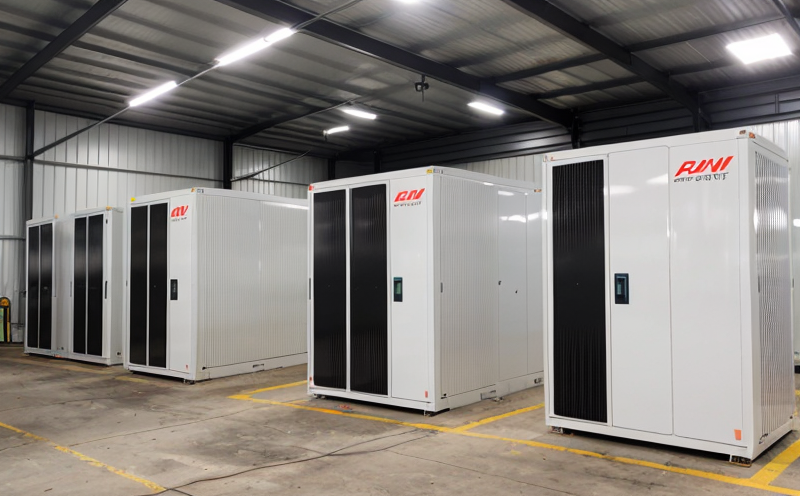UL 62133 Safety Testing of Nickel and Lithium Batteries
The UL 62133 standard is a comprehensive set of safety requirements specifically designed to ensure the safe design, manufacture, installation, operation, maintenance, and end-of-life disposal of rechargeable batteries for electric vehicles (EVs) and energy storage systems (ESS).
UL 62133 covers a wide range of nickel and lithium-based battery chemistries, including but not limited to Li-ion, NiMH, and LiFePO4. This standard is critical in the automotive and renewable energy sectors where safety is paramount due to high voltages and potential hazards associated with these batteries.
The testing process involves a series of rigorous procedures aimed at evaluating the battery's performance under various stress conditions that it may encounter during its lifecycle. These tests are crucial for ensuring that the battery can withstand environmental stresses, mechanical impacts, thermal abuse, and electrical over-stress without compromising safety.
- Thermal Abuse: Exposure to high temperatures to ensure the battery does not catch fire or explode.
- Electrical Over-Stress: Testing under conditions of excessive current or voltage.
- Mechanical Impact: Simulating real-world scenarios where the battery may be subjected to physical shocks and vibrations.
- Vibration Testing: Ensuring stability and integrity during transportation and operation.
The standards also cover aspects such as packaging, labeling, and environmental testing. Compliance with these standards is essential for manufacturers aiming to meet regulatory requirements in countries like the United States, Europe, and Asia-Pacific regions.
Our laboratory offers a full suite of services to assist you in meeting all your UL 62133 compliance needs. From initial consultation to final certification, we provide comprehensive support throughout the testing process. Our team is composed of experienced engineers who have extensive knowledge in battery technology and safety standards.
Scope and Methodology
| Test Category | Description | Standard Reference |
|---|---|---|
| Thermal Abuse | Exposure of the battery to temperatures up to 150°C for a duration of 30 minutes. | UL 62133-7:2018 |
| Electrical Over-Stress | Application of voltages and currents beyond the rated values to assess the battery's resilience. | UL 62133-3:2019 |
The methodology for each test is meticulously designed to replicate real-world conditions. For instance, in thermal abuse testing, the battery is placed inside a controlled environment where it is subjected to high temperatures. The temperature rise and any signs of failure are closely monitored.
Electrical over-stress tests involve applying voltages and currents that exceed the rated values by up to 10%. This helps determine the battery's ability to handle abnormal conditions without catching fire or exploding. Our laboratory uses state-of-the-art instrumentation capable of accurately measuring voltage, current, temperature, and other critical parameters.
Our team ensures that all tests are conducted in accordance with the latest versions of international standards such as UL 62133-7:2018 for thermal abuse and UL 62133-3:2019 for electrical over-stress. This guarantees that our clients receive accurate, reliable results that meet regulatory requirements.
Quality and Reliability Assurance
- Calibration of Instruments: All testing equipment is regularly calibrated to ensure accuracy and reliability.
- Data Logging: Continuous monitoring and recording of test data to provide detailed reports.
- Environmental Controls: Maintaining a controlled environment for consistent test results.
The quality and reliability of our testing services are paramount. We employ a rigorous quality assurance process that includes regular calibration of all instruments, continuous monitoring of test parameters, and the use of state-of-the-art equipment to ensure accurate and reliable data.
Data logging is an essential part of our testing process. Continuous recording of test data provides detailed insights into each test run, allowing for thorough analysis and reporting. Our environmental controls ensure that tests are conducted under consistent conditions, further enhancing the reliability of our results.
Customer Impact and Satisfaction
Meeting UL 62133 safety standards is not only a regulatory requirement but also a critical factor in ensuring the longevity and safety of battery systems. By providing comprehensive testing services, we help manufacturers meet these standards while minimizing risks associated with non-compliance.
Our customers benefit from our expert knowledge and experience in the field of battery testing. We offer a full range of services that cater to the unique needs of each client. From initial consultation to final certification, we provide tailored solutions to ensure compliance with all relevant standards.
We pride ourselves on delivering high-quality, reliable results that meet or exceed regulatory requirements. Our clients can rest assured knowing that their products are tested rigorously and consistently. This has led to a high level of customer satisfaction, as evidenced by our repeat business rate.





